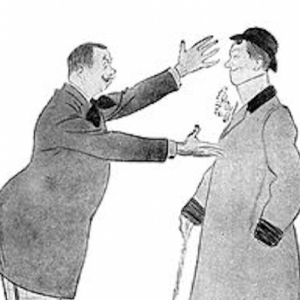No surrender, no peace.
Eight years ago, the French marked a hugely important cultural milestone in celebrating the 350th anniversary of the Academie Francaise, whose 40 distinguished members act as guardians of French language purity.
They pronounced 2014 as “the year of winning back French from the English peril” and saving it from “Anglo-Saxon” pollution, whether it emanates from Great Britain or the USA.
This is why French mother tongue speakers don’t travel by jumbo jet; they board an “avion gros porteur,” no doubt carrying a “portable” rather than a laptop.
Paris has just relinquished the six-month rotating presidency of the 27-member European Union (the Czech Republic has replaced it), a changeover that may imperil 2022 “the year of the French language,” declared by President Emmanuel Macron as a morale booster.
He was clear about its ambition: the populist leader hates the declining use of French in the EU’s daily business — and should be stopped or, better still, reversed to make French the lingua franca it was in the ’60s and ’70s.
For several reasons, this is a long shot … or a “coup difficile a reussir.” It is framed by a paradox that Macron, an excellent English speaker, acknowledges — namely that although the United Kingdom has self-ejected from the EU (“Brexit”), the soft power of its language is deep-fixed across the continent.
The three working languages in the EU institutions are English, French and German — in that order of usage — though only Ireland and Malta are officially English speakers in the EU club.
Putting French petulance aside, there is a global context to consider. According to a study partly sponsored by the EU (“Languages in Europe, Theory, Policy and Practice”), English is unprecedented in world history. It has achieved a “hyper-centrist role,” say the authors, who note that 80 percent of the globe’s home pages are in “some kind of English,” which drives the information technologies.
For the same reason that China and India compete to invest in learning English — believing it to be synonymous with successful commerce or science. Its standing isn’t because English is superior or necessarily more useful but a reflection of geo-political realities, leaning heavily on Britain’s colonial past and the United States’ superpower status. At this point, it has no practical rival.
The joke about the most common language in Europe invites the reply: “Bad English.” It doesn’t matter. English is supremely adaptable, a linguistic bring-and-buy yard sale that is unembarrassed by its theft of foreign words if they seem more apposite.
An “English Academy” would be laughed into the ground as soon as it opened. The historical irony is that so much English vocabulary has seeped across from France for centuries.
A further irony: it’s a Frenchman — Jean-Paul Nerriere — a former IBM executive who has invented “Globish,” a sub-set of 1,500 English words with stripped-down syntax, which he calls “de-caffeinated English” or “English Lite,” allowing two non-English mother tongue speakers to communicate or negotiate.
He has trademarked his work and written a popular text titled “Don’t Speak English, Parlez Globish,” aspiring to hear it used in the diplomatic corridors of the United Nations and Brussels, the self-styled capital of Europe.
The book is translated into 18 languages. Its author claims his work is “helping to rescue French”; he reasons a widespread use of Globish would be to the detriment of English, limiting “Anglo-Saxon” dramatically.
However, some multicultural experts identify monolingual English speakers as impediments to better communication. Jennifer Jenkin, the Southampton University professor of “Global Englishes” no less, believes they speak too fast to foreigners, use slang and deploy tribal references and jokes only understood by their own kind. Because of the language’s domination, the Hooray Henrys don’t feel a need to make sympathetic concessions; they just turn the volume up.
Intercultural trainer Chia Suan Chong puts it this way: “Suddenly, the American or Brit walks into the room and no one can understand them.”
“Mon Dieu!” — as the French would certainly exclaim.

